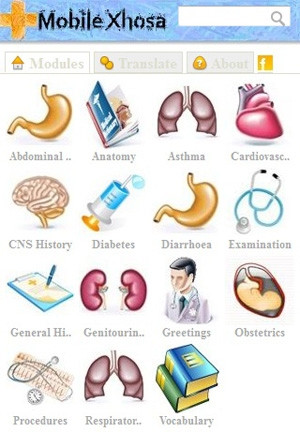
A University of Cape Town medical student has designed a mobisite that provides Xhosa-English medical translations to improve the provisioning of healthcare to patients.
Final-year medical student, Saadiq Moolla, who is also president of SHAWCO Health, realised the need for Mobile Xhosa when struggling to communicate effectively with Xhosa-speaking patients. He notes that while students learn the language at university, their proficiency is often not at the required standard to ensure adequate information transfer.
"I know what this is like from the patient's perspective, having experienced the same thing during a trip to Egypt," says Moolla. "But our patients are experiencing this in their own country."
Hence the inspiration for Mobile Xhosa. "The site started as a handy reference for myself, but as it grew, I realised others could benefit from it too," explains Moolla. "I think patients in rural areas will benefit the most, as they most often do not speak English or Afrikaans as an additional language, and therefore have the most difficulty communicating with their doctors."
Phrases and terminology are grouped into a number of modules, including 'anatomy', 'asthma', 'obstetrics', 'general history', 'respiratory', etc. Beneath each module are a number of common questions and instructions translated from English into Xhosa. In the 'examination' module, for example, there are translations for 'please undress', 'please get onto the examination bed' and 'I would like to examine you'. There is also a dictionary and a translation engine that allows users to insert words or phrases to translate from English into Xhosa, or from Xhosa into English.
Moolla says he has received a lot of encouragement from academia, the industry and students, with some using the site in "unexpected" ways. "I have heard from healthcare workers other than doctors, such as psychologists and speech-language pathologists, who are also using the site."
UCT reports that a common problem faced by healthcare practitioners is how to translate medical questions and ailments into another language accurately enough to provide correct diagnosis and treatment.
The value of communicating medical information to patients in their mother tongues, as opposed to English, is critical, says Moolla. "It helps to build trust and rapport between patient and doctor. It also ensures that the correct information gets across."
He told UCT: "It helps so much to be able to explain to a patient that you will be taking blood, for example, so that they understand what you're doing and why. It reduces anxiety and improves the quality of care."
Moolla chose Xhosa because it is the most common first language in the Western Cape, but he plans to translate the site into Zulu and launch Mobile Zulu soon, as well as add functionality to include sound bites to help with pronunciation.
Mobile Xhosa is free to use and can be accessed here.
Share